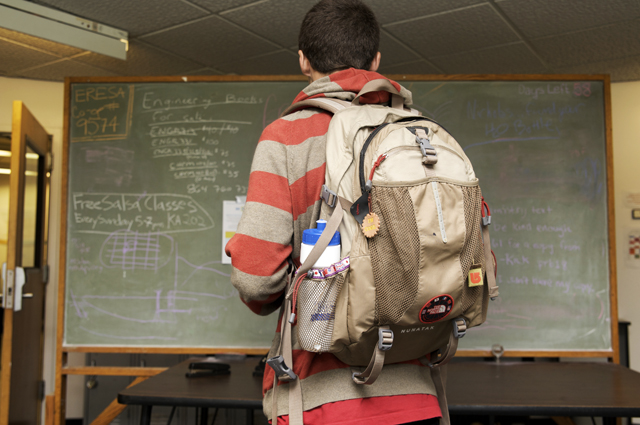
If you’ve ever wondered how much your lifestyle affects your lifespan, you’re probably not alone. While researchers agree that certain behaviors—like healthy eating and exercise—can lengthen our lives, it’s clear that some of us have a genetic predisposition to live longer. When it comes to living well into our nineties, what’s more important: behavior or genetics?
That’s one of the topics to be explored at HSU’s undergraduate anthropology symposium, a one-day event featuring the latest research from students in cultural, archaeological, biological and linguistic anthropology. Free and open to the public, the first-ever conference will feature poster and podium presentations from 24 undergraduates.
Among the two-dozen topics to be explored: coming of age rituals; the effects of sea-level rise on coastal archaeology; the anthropology of jokes and the link between hygiene and health.
“We have a lot of undergraduate students conducting graduate research at HSU,” says anthropology professor Mary Glenn, whose ANTH 329 students organized the event. “This gives them the opportunity to not only present their work but also share their findings with the community.”
From collecting raw data to performing lab experiments, Glenn’s students used a variety of graduate-level methods to support their research. Students Vincent Velasquez and Tia Meyer ran a series of tests on students in HSU’s Biomechanics Lab to determine the effect of backpacks on arm swing.
For her project on grain-fed vs. grass-fed beef, student Justine Cook conducted an extensive literature of scholarly journals accessible through the HSU Library. And for her research on human longevity, student Sarah Williams created and distributed a comprehensive survey assessing the lifestyle choices of senior citizens. By analyzing respondents’ diet and exercise habits; smoking and alcohol consumption; mental health and stress levels, she hopes to shed light on the connection between genes, behavior and lifespan.
“I was raised to believe—as I’m sure many others were—that we can control our lifespan by making healthful choices with our behavior, but I’ve also had some relatives who lived quite unhealthy lives well into their nineties,” she says. “Who wouldn’t like to know if their behavior actually had little influence on how long they lived?” she says.
Other topics to be presented Nov. 29:
- ‘The Hygiene Hypothesis: Is cleanliness making us sick?’ by Alicia Powell
- ‘Are you connected? Exploring social dance communications’ by Emma Green
- ‘Coming of age rituals’ by Kai Heifetz
- ‘The effects of sea-level rise on coastal archaeology, a case study at Tolowa Dunes State Park, Del Norte County, CA’ by Erin Chiniewicz
- ‘Mischief managed: An analysis of the online Harry Potter community’ by Holly Cavanaugh
- ‘What’s so funny? Applications in the anthropology of jokes’ by Nikki Martensen, Casey Dobbins and Rachael Marte-Taylor
- ‘My pinch on the rock climbing community: A deeper look at what makes a climbing community’ by Mackenzie Terzian
The symposium is free and open to the public. Doors open at 6 p.m. and podium presentations begin at 6:30 p.m. A question and answer session will follow each presentation.
For more information, visit humboldt.edu/anthropology or contact Mary Glenn in the Anthropology Department at (707) 826-3126.